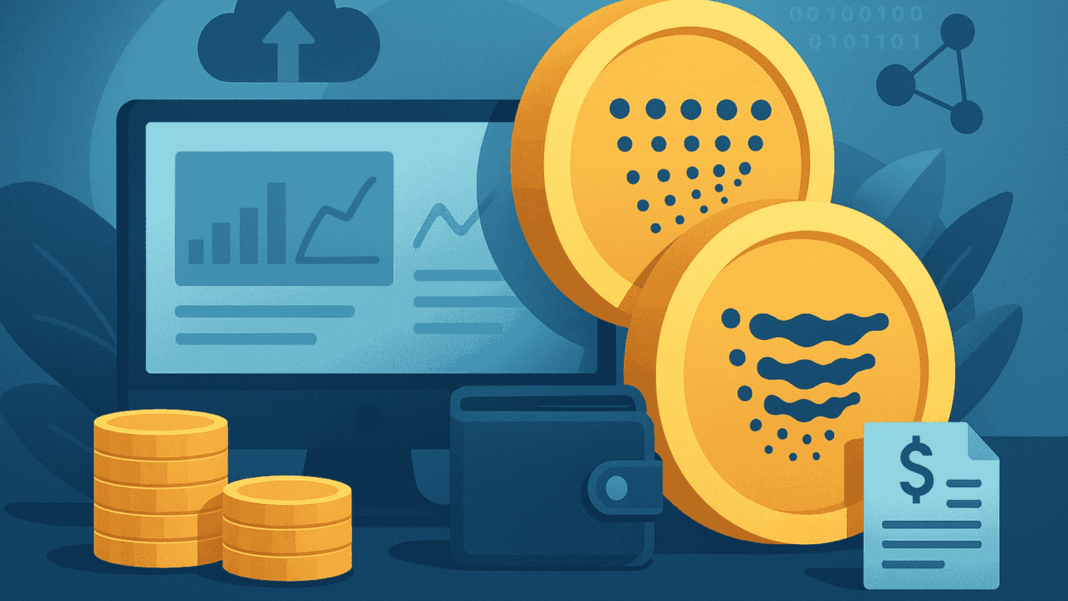- Ocean Protocol’s monetization model now supports royalties, subscriptions, and data licensing.
- Compute-to-Data enables privacy-first data monetization for enterprises.
- OCEAN token gains new utility as a yield asset tied to data sales and marketplace activity.
In the age of AI, machine learning, and predictive analytics, data has emerged as the most valuable resource of the digital era. Yet, for years, the monetization of data has remained centralized — controlled by tech giants with walled ecosystems. Ocean Protocol is working to change that. With its 2025 monetization revamp, Ocean is aiming to redefine who owns data, how it’s valued, and how it’s exchanged across industries.
Ocean Protocol isn’t just a blockchain project; it’s a vision for a decentralized data marketplace. In 2025, the protocol is rolling out new features and tokenomic adjustments that may finally allow individuals, researchers, and enterprises to earn meaningful income by publishing, curating, and consuming datasets in a trustless environment.
Ocean v5: Rebuilding the Core for Monetization
Ocean’s newest release, dubbed Ocean v5, introduces a redesigned infrastructure focused on usability, scalability, and monetization. The emphasis is no longer just on tokenising data but on creating sustainable economic flows around it.
The most notable upgrade is the Data NFTs 2.0 framework — which now includes built-in royalty structures, subscription models, and permissioned access layers. Data publishers can issue time-locked or usage-based licences, enabling recurring revenue streams. This is a significant departure from the old one-time-sale approach.
Furthermore, data consumers — including AI developers, universities, and enterprise clients — can now interact with Ocean datasets through standardized APIs and SDKs. This reduces friction and positions Ocean as a serious infrastructure layer for AI model training.
Compute-to-Data: Privacy-Preserving Monetization
One of Ocean’s standout features continues to be Compute-to-Data, and it’s received major enhancements in this new monetization era. The idea is simple but powerful: instead of sending private data to a model, the model is sent to the data.
This mechanism allows enterprises — think hospitals, governments, or financial institutions — to monetize sensitive data without ever exposing it. In 2025, Ocean has expanded this feature to support multi-party computation (MPC) and federated learning setups, making it attractive to regulators and risk-averse industries.
The end result? Valuable datasets that were previously off-limits are now part of the marketplace — securely monetized, compliant, and usable for training powerful AI models.
Tokenomics: OCEAN Gains New Utility
The $OCEAN token, once primarily a staking and curation mechanism, is evolving into a more multifaceted asset in Ocean’s economy.
Here’s what’s changed in 2025:
- Revenue Sharing: A portion of fees from data sales and compute jobs now flows back to OCEAN stakers.
- Dynamic Pricing Pools: Inspired by AMMs, Ocean has introduced adaptive pricing based on dataset demand and quality scores.
- Reputation-Weighted Rewards: Publishers and curators with high engagement and positive buyer feedback receive enhanced visibility and income.
This expanded utility is shifting OCEAN from a speculative asset to a genuine yield-bearing token — tied directly to the performance of the marketplace.
Ecosystem and Partnerships: Growing the Demand Side
For data monetization to succeed, demand must match supply. That’s why Ocean Protocol has focused heavily on partnerships in 2025 — particularly within AI, IoT, and climate research sectors.
Collaborations with data-hungry verticals such as
- AI startups in the compute space (partnering with platforms like Fetch.ai and iExec)
- Decentralized science (DeSci) collectives using Ocean to fund research with on-chain data sales
- Climate modeling groups, publishing real-time environmental data via Ocean’s permission layers
These integrations expand Ocean’s footprint and validate its infrastructure as more than just an experiment—it’s becoming a foundational protocol for the open data economy.
Challenges and Criticism: Can Adoption Scale?
Despite the momentum, Ocean still faces challenges:
- User onboarding remains complex for non-Web3 natives.
- Valuation of data is still largely experimental and lacks standardized benchmarks.
- Market liquidity for niche datasets can be thin, especially in less commercial domains.
That said, Ocean’s team has acknowledged these issues and is actively working on UI/UX improvements, education portals, and DAO governance proposals aimed at addressing adoption friction
Outlook: Ocean’s Monetization Bet Could Pay Off
What sets Ocean apart in 2025 isn’t just its technical depth — it’s the fact that its monetization model aligns with real-world economic incentives. By empowering users to control, license, and earn from their data in new ways, Ocean is offering an alternative to the exploitative data models of the past decade.
If the protocol continues to improve usability and deepen its integrations with data-heavy verticals, it could become the go-to infrastructure for decentralized data monetization in the Web3 age.


